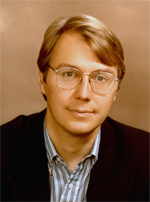Andrew H. Knoll, Ph.D., the Fisher Professor of Natural History and professor of earth and planetary sciences at Harvard University, will deliver the second annual Robert M. Walker Distinguished Lecture at 7 p.m. Friday, Oct. 30, in Room 300, Laboratory Sciences Building.
The venue has been changed from its original location due to increased popularity.

Knoll, who has analyzed salt deposits in rock discovered by NASA’s Mars Exploration Rover Opportunity, will discuss “Mars as the Abode of Life?” during the free lecture that is open to the public.
The McDonnell Center for the Space Sciences in Arts & Sciences sponsors the lecture series in memory of Robert M. Walker, Ph.D., the center’s inaugural director. Walker was a pioneering physicist who helped shape research in the space sciences, said Ramanath Cowsik, Ph.D., professor of physics in Arts & Sciences and director of the center.
The Mars rovers Spirit and Opportunity documented surface features, such as ripples in sand, that seemed to indicate portions of Mars had been covered with flowing water.
But Knoll and his colleagues reported in the journal Science last year that analysis of salt deposits in four-billion-year-old Martian rock suggest the water was too salty to support life as we know it. It remains possible that Mars was wetter and more hospitable in the first few hundred million years of its existence, and sedimentary rocks deposited during that period may yet reveal preserved remains of ancient Martian life.
Knoll also will deliver a colloquium titled “The Deep History of Life” at 4 p.m. Thursday, Oct. 29, in Room 201, Crow Hall, as part of the lecture series. A coffee reception will be held at 3:30 p.m. in Room 245 of Compton Hall. Both are free and open to the public.
In his book “Life on a Young Planet: The First Three Billion Years of Life,” Knoll points out that life mainly was unicellular for the first three billion years of the Earth’s 4.6-billion-year history. Knoll will discuss this deep history and the geochemical proofs that life existed long before it could be preserved in the form of a fossil.
Of course the deepest mystery of deep history is the origin of life. Knoll, who compares the problem of the origin of life to a maze, thinks the exact route that life took through this maze may never be learned, although several possible entry points have been found. “We remain in substantial ignorance,” Knoll said, and predicts his grandchildren will be equally mystified.
On the other hand, Knoll said, it is becoming clear that life required chemistry that is probable, efficient and a natural extension of the chemistry of the planet’s surface. Life isn’t different from the rest of the planet but rather part of the planet’s fabric. And this suggests that should humans find extra-solar planets that orbit their stars in the so-called “habitable zone,” neither too close nor too far, it may be part of their fabric as well.
“Andy Knoll is a pre-eminent scientist who is finding important clues to the question of life’s origins on Earth and elsewhere,” Cowsik said. “He is well-known for his lucid presentations, and we may all look forward to a wonderful set of lectures during his visit.”
For more information, visit mcss.wustl.edu or call 935-6276.